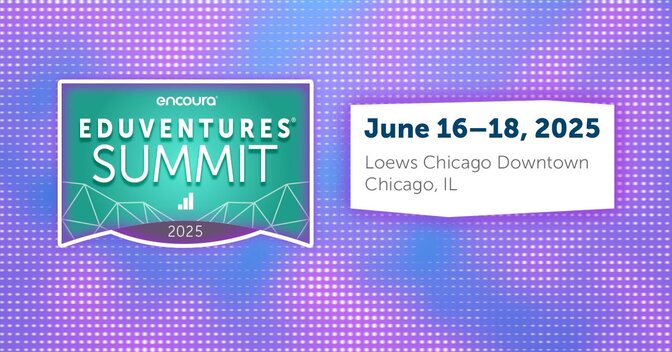When launching a new online master’s program, institutions often start by considering which successful campus-based programs they could put online. This strategy has become standard practice: CHLOE 9 found that two-thirds of chief online learning officers identified “creating online versions of on-campus degrees” as a top priority.
For administrators, the promise of online enrollment and revenue growth is compelling. Faculty, however, worry about how the new online program might impact their existing programs. Program “cannibalization” is a frequent concern.
But do online and in-person master’s prospects have the same program preferences? What should your institution consider when launching an online master’s degree based on a successful in-person program?
According to the National Student Clearinghouse, master’s enrollment grew by 3.3% from 2023 to 2024 and is now larger than the historic high point in 2021. This growth, however, is unlikely to be sustained due to the declining graduate enrollment rate, the looming graduate student demographic cliff (the ripple effect of the traditional undergraduate cliff), increased competition, and an unstable international market.
Given these challenges, institutions seeking enrollment growth are turning toward online opportunities, often by adapting successful campus-based programs. With a new program modality, enrollment "cannibalization" is a common and valid concern, however, it is important to identify how on-campus students differ from online students.
Campus & Online Prospective Student Differences
The Eduventures Adult Prospect Research™ asks prospective adult students which program features they would be willing to pay more for. As we know, affordability is a top consideration for all adult learners, so identifying what program features they place a premium on allows us to understand which features they value most.
Figure 1 shows the top five features that both in-person and online master’s prospects would be willing to pay more for.
Figure 1. Campus/In-Person vs. Online Master’s Prospect’s Valuable Program Features
|
Program Feature Rank |
Top Program Features for Campus/ In-Person Master’s Prospects |
Program Feature Rank |
Top Program Features for Online Master’s Prospects |
|---|---|---|---|
|
1 |
High Quality Faculty (42%) |
1 |
Fully Online Coursework (54%) |
|
2 |
Proximity to Where I Live/Work (27%) |
2 |
Self-paced Program (31%) |
|
3 |
Program Aligned With My Career Goals (25%) |
3 |
Reputation (28%) |
|
4 |
Evidence of Successful Career Placement (22%) |
4 |
Program Aligned With My Career Goals (26%) |
|
5 |
Reputation (20%) |
5 |
Accelerated Program (24%) |
Notably, both online and on-campus master’s prospects value two of the top five program features: “alignment with career goals” and “the reputation of the college or university.” The emphasis on career alignment is unsurprising, given that many master’s students pursue graduate education to further their career goals. Similarly, institutional reputation plays a key role in shaping perceptions of program quality and long-term value.
Online prospects report a willingness to pay more for fully online coursework—even as they expect lower out-of-pocket costs than their on-campus counterparts. Conversely, place-based prospects indicate they would pay a premium for programs located near where they live or work. Both groups value flexibility, though they prioritize different modalities from the start.
Online prospects also prioritize their time, seeking self-paced programs and accelerated programs. Campus/in-person master’s prospects value quality indicators such as “high-quality faculty”—their top program feature and evidence of successful career placement.
These prospects also differ in other critical ways. The Adult Prospect Research indicates that on-campus/in-person master’s prospects are younger (early-to-mid 20s) while online prospects skew older. There are also gender differences, with women showing a higher preference for online learning than men, which varies by field of study.
Given the distinctions between online and on-campus prospective students, a critical question remains for institutions wanting to launch an online program: What factors might draw students away from an existing on-campus option?
Tasty Campus Program
Launching an online program can be challenging. But having a successful campus-based program provides valuable faculty experience, student outcomes, and established positioning. Here are some potential ways a new online program launch could spell trouble for your campus program.
- Campus Location. If an institution is in a remote area with limited job opportunities, prospects may prefer an online program over relocating to campus. Conversely, if an institution is in an urban area, prospects might consider online programming to avoid dealing with traffic or a higher cost of living. Either way, the time and cost of coming to campus can be a determining factor.
- Program and Market Size. In general, the more specialized a program is, the smaller the prospective student pool. As a result, offering both in-person and online modalities could divide a small audience. Alternatively, launching a broader, more general online master’s—such as an MBA, MEd, or MSN—may seem like a safer bet, but these markets tend to be highly competitive.
- Lack of Differentiation. If an institution generically promotes both online and campus programs in the same way to the same audience without differentiation, it can create confusion among both sets of prospects. This can potentially lead to campus enrollment decline or underperformance in the new online program. It is essential to clearly distinguish the programs and their intended audiences, as each segment prioritizes different program features.
- Price Differential. Some institutions have adopted radical pricing strategies for online programs. For example, in fall 2020, Boston University (BU) launched a $25,000 online MBA with edX that now has about 2,000 students. Meanwhile, enrollment in BU’s $115,000 part-time campus MBA dropped from 179 (2018) to 119 (2024). While our research shows that campus-based prospects are willing to pay more out of pocket than online prospects, price differences for the same program across modalities should be carefully considered as price is often unconsciously tied to quality perceptions.
When launching an online program, these and other factors must be closely examined. For instance, if a campus-based master’s program is more theoretical, it is essential to adapt the program to be more skills- and application-focused to meet the needs of working professionals.
The Bottom Line
Eduventures forecasts that both campus-based and online master's markets will remain largely flat in the coming years. Rising unemployment and fewer job postings, however, mean that now is an opportune time to identify and launch online program opportunities.
But launching an online program comes with risk beyond cannibalizing existing campus enrollment: There are more online master’s degree options than ever before.
With this hyper competitive landscape in mind, institutions should follow these critical steps to successfully launch an online program from an existing campus offering:
- Identify the online audience. Understand who online prospects are, what they value, and how they differ from campus-based students.
- Differentiate the online program. Ensure the program is different from the campus-based program—this may include curricular adjustments or unique features.
- Design for online learner needs. Consider structural components such as multiple start dates and accelerated terms.
- Tailor messaging and promotion. Clearly articulate value propositions that resonate with online prospects, from career alignment to affordability and flexibility.
Eduventures helps institutions navigate these challenges. The Online Degree Database® enables institutions to assess an online program’s competitive landscape. Alternatively, we assess a specific online program market to guide program design and go-to-market strategies.

Eduventures Summit – higher education's premier thought leadership event – is returning to the Windy City next year. Secure your spot today!

